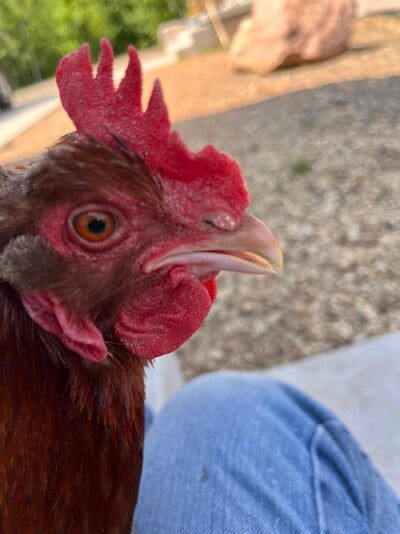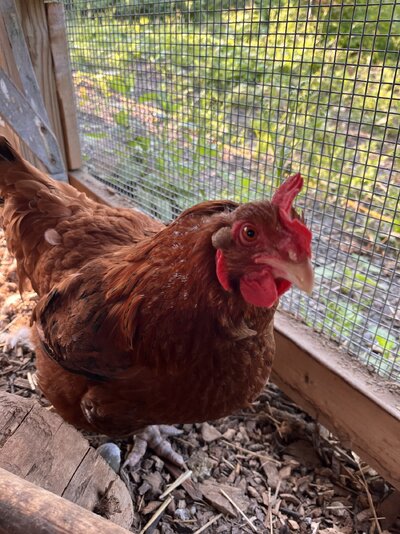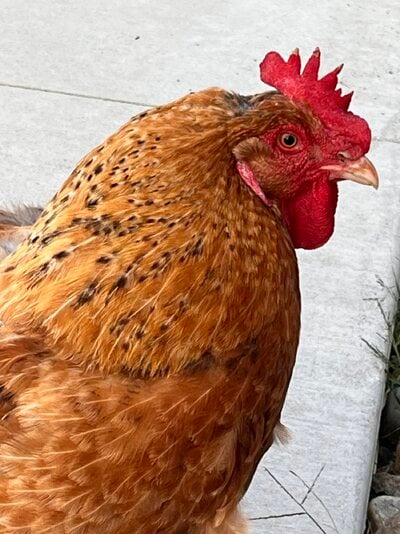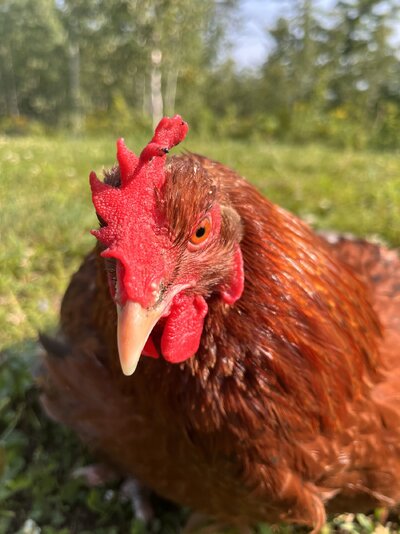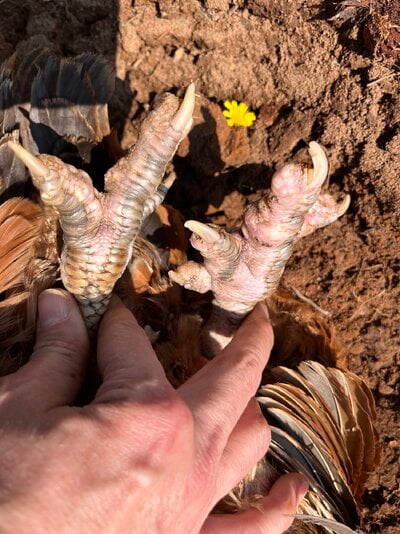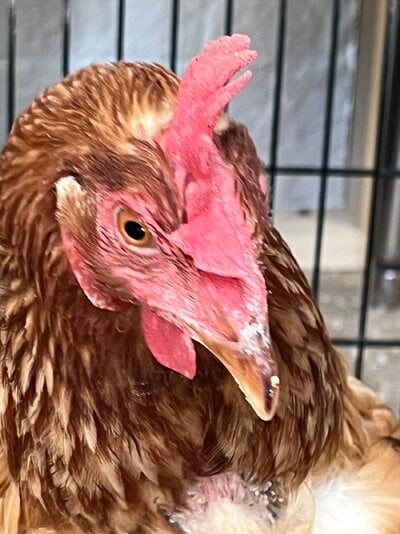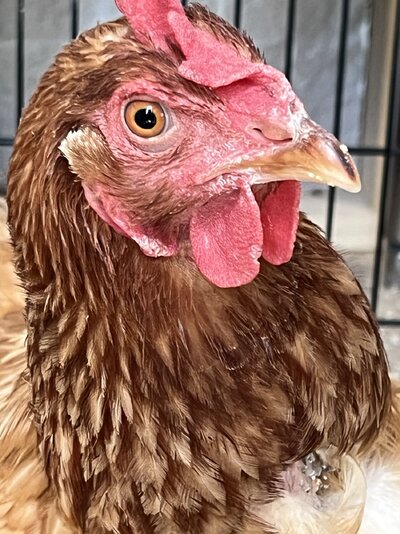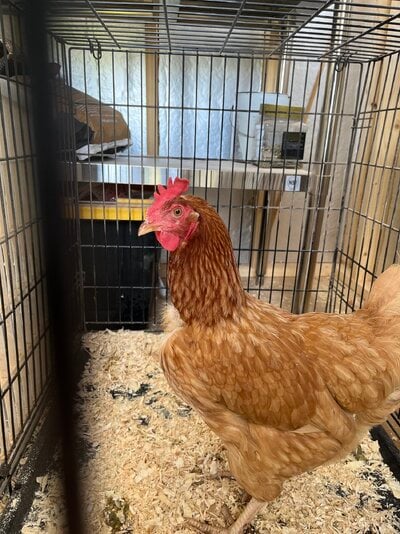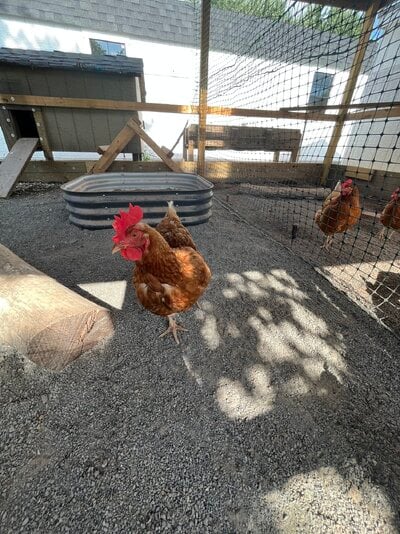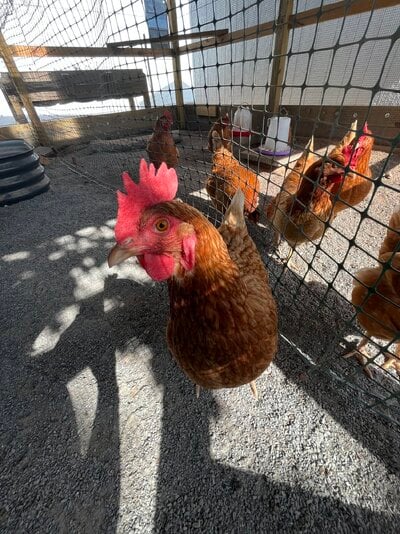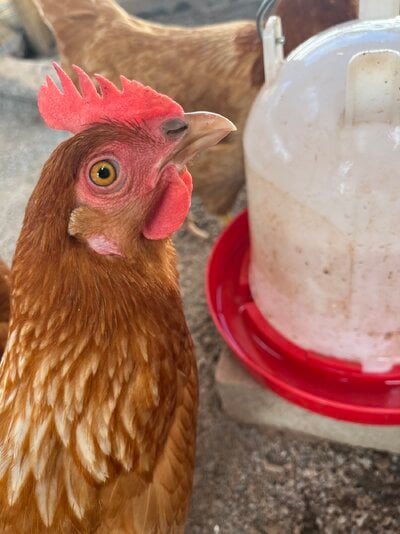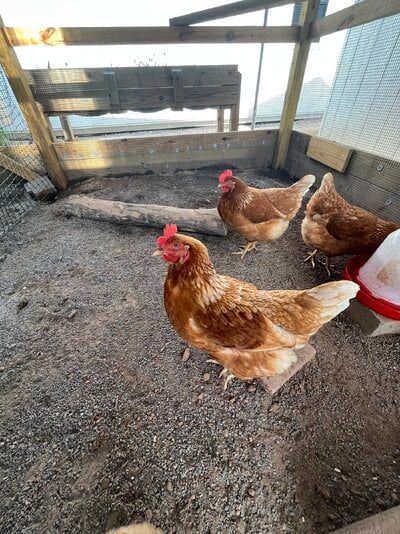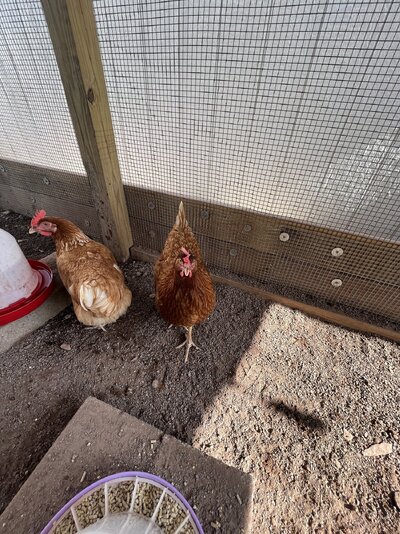- Thread starter
- #21
Navigation
Install the app
How to install the app on iOS
Follow along with the video below to see how to install our site as a web app on your home screen.
Note: This feature may not be available in some browsers.
More options
You are using an out of date browser. It may not display this or other websites correctly.
You should upgrade or use an alternative browser.
You should upgrade or use an alternative browser.
Please help
- Thread starter lwakes
- Start date
Feed store, or where ever you buy your chicken feedwhere do you get that?
I have a flock of 9 chickens. In the last month I’ve lost 3. The 3 are ones that got sick over the past spring and all had prolapsed vents.
I have the six left and two of them are quarantined right now because of another issue.
The flock got treated for mites and lice and they have all been supported with probiotics and such. The second one has been missing feathers on her chest all summer, she’s thin, and now her face has developed this white-ish stuff.
I now have 7 new chickens that my husband brought home in March. They are in the same run as the others but still separated.
All symptoms seemed to be so close in any sickness.
I'm sorry you're having troubles.neither of the two that are separated right now have had a prolapse. I suspected egg binding. I got them from a co-worker june of last year. They were good up until the spring.
I may be missing something, so please forgive me.
Exactly what "symptoms" are you concerned about?
Can you get photos of the poop?
I see you mention 2 are quarantined - why? What's the symptoms? You mention white on the face? The white on the face and earlobes looks like classic normal coloring for a hybrid hen. As they age, the white may become more prominent. I see clear eyes and nostrils, some feather loss which could be from molting, parasites (do/did you see parasites?) and/or picking.
You mention you lost 3 in the last month, but they were also the ones that had previous difficulties with prolapse. Am I reading that correctly? If so, then perhaps then they had reproductive issues all along and it was coincidental. Sometimes once a hen has a prolapse, they had a hard time recovering and the issues usually start. Unless you performed a necropsy or had one done through your state lab, then it's just guesswork.
Some of your issues started in March(?) with bringing in new birds? They are in the same run, but separated(?) because of concerns that they may give/get something? If they are in the same space/area, then if you have something contagious, all are exposed.
If your hens are egg bound, then they would not be pooping, they would be in distress. A truly egg bound hen is not going to live for more than 24hrs.
If they are eating/drinking/pooping/relatively active, then I would put them back with their flock so they don't lose their place within their flock.
Feed them a nutritionally balanced poultry feed free choice. Provide grit and oyster shell free choice and fresh drinking water.
Treat mites/lice with a Permethrin based poultry spray or dust. Treat all birds and their housing in 5-7 day intervals.
- Thread starter
- #24
The first one is separated bc she just looks puffy, comb is flopped over and the back of it had a bluish tint to it, she moves slow and has been staying away from the other chickens, she wasn't pooping much, although she's pooping now. it's very wet and looks like diarrhea. At one point she seemed to be having a hard time breathing. she was breathing heavy and I could hear noises. She's not doing that anymore either. She free ranges fine, is eating and drinking fine as well.I'm sorry you're having troubles.
I may be missing something, so please forgive me.
Exactly what "symptoms" are you concerned about?
Can you get photos of the poop?
I see you mention 2 are quarantined - why? What's the symptoms? You mention white on the face? The white on the face and earlobes looks like classic normal coloring for a hybrid hen. As they age, the white may become more prominent. I see clear eyes and nostrils, some feather loss which could be from molting, parasites (do/did you see parasites?) and/or picking.
You mention you lost 3 in the last month, but they were also the ones that had previous difficulties with prolapse. Am I reading that correctly? If so, then perhaps then they had reproductive issues all along and it was coincidental. Sometimes once a hen has a prolapse, they had a hard time recovering and the issues usually start. Unless you performed a necropsy or had one done through your state lab, then it's just guesswork.
Some of your issues started in March(?) with bringing in new birds? They are in the same run, but separated(?) because of concerns that they may give/get something? If they are in the same space/area, then if you have something contagious, all are exposed.
If your hens are egg bound, then they would not be pooping, they would be in distress. A truly egg bound hen is not going to live for more than 24hrs.
If they are eating/drinking/pooping/relatively active, then I would put them back with their flock so they don't lose their place within their flock.
Feed them a nutritionally balanced poultry feed free choice. Provide grit and oyster shell free choice and fresh drinking water.
Treat mites/lice with a Permethrin based poultry spray or dust. Treat all birds and their housing in 5-7 day intervals.
The second one I separated because her comb started looking droopy as well, Then I was seeing spots and the white stuff which was within a day and I didn't know if it was fowl pox. I checked her for mites and thought she might have had then. Everyone got a mite/lice treatment with elector psp. I checked them all not last night but the night before and did not see anything crawling around on them or their roosting bars.
So sorry this is happening to you and your flock.
The white papules on the comb, nose and ‘frost’ on the earlobes is exactly what I saw in two of my birds. None of the experts on BYC had an answer. It started with whitish velvety dry frost on earlobes in a few other birds so applied apple cider vinegar directly with a q-tip. I did that every other day. I thought it to be fungus. I ended up using pointed tweezers to pull off the lesions from my EE comb and applied ACV. No bleeding occurred. I added ACV to their water. After two weeks it was all gone. I still use ACV in waterers to
Examine those lesions in the comb and look at the skin/ beak borders, mouth edges. I had one girl with a papule in lower beak in the mouth.
My best guess is wild birds brought it in and a combination of hot, humid rainy weather sparked growth.
I’m interested to hear if this is similar in your situation. pls let us all know. We can’t be the only ones.

The white papules on the comb, nose and ‘frost’ on the earlobes is exactly what I saw in two of my birds. None of the experts on BYC had an answer. It started with whitish velvety dry frost on earlobes in a few other birds so applied apple cider vinegar directly with a q-tip. I did that every other day. I thought it to be fungus. I ended up using pointed tweezers to pull off the lesions from my EE comb and applied ACV. No bleeding occurred. I added ACV to their water. After two weeks it was all gone. I still use ACV in waterers to
Examine those lesions in the comb and look at the skin/ beak borders, mouth edges. I had one girl with a papule in lower beak in the mouth.
My best guess is wild birds brought it in and a combination of hot, humid rainy weather sparked growth.
I’m interested to hear if this is similar in your situation. pls let us all know. We can’t be the only ones.

- Thread starter
- #26
I have noticed white areas on their earlobes as well. It’s sounding very similiar to what you’re dealing with as well.So sorry this is happening to you and your flock.
The white papules on the comb, nose and ‘frost’ on the earlobes is exactly what I saw in two of my birds. None of the experts on BYC had an answer. It started with whitish velvety dry frost on earlobes in a few other birds so applied apple cider vinegar directly with a q-tip. I did that every other day. I thought it to be fungus. I ended up using pointed tweezers to pull off the lesions from my EE comb and applied ACV. No bleeding occurred. I added ACV to their water. After two weeks it was all gone. I still use ACV in waterers to
Examine those lesions in the comb and look at the skin/ beak borders, mouth edges. I had one girl with a papule in lower beak in the mouth.
My best guess is wild birds brought it in and a combination of hot, humid rainy weather sparked growth.
I’m interested to hear if this is similar in your situation. pls let us all know. We can’t be the only ones.

I will add that you may be dealing with other diseases as well. so by all means don’t ignore that possibility. My post is specifically addressing those white spots.
Here’s a pick of what I saw in my flock. The red hen also had foot gout for a year but these hard papules affected her feet (either directly or indirectly by accelerating uric acid) and rapidly deformed her feet to the point of incapacitation.
The golden bird has earlobe frost, is alive today. My EE fully recovered.
Here’s a pick of what I saw in my flock. The red hen also had foot gout for a year but these hard papules affected her feet (either directly or indirectly by accelerating uric acid) and rapidly deformed her feet to the point of incapacitation.
The golden bird has earlobe frost, is alive today. My EE fully recovered.
Attachments
- Thread starter
- #28
- Thread starter
- #29
- Thread starter
- #30
New posts New threads Active threads
-
Latest threads
-
-
Is my Sweet Barnevelder a pullet or a roo? Please don't say roo
- Started by clemens204
- Replies: 4
-
-
Duck has mucus buildup in nostrils and whistling breath
- Started by Mallard_Bantam
- Replies: 0
-
Good hatcheries on southeastern seaboard ?
- Started by CharlesnBlue
- Replies: 0
-
-
Threads with more replies in the last 15 days
-
Checking-In On Peeps - Post Here To Say Hello!
- Started by Nifty-Chicken
- Replies: 1K
-
-
-
-
Can I get some help from someone with careless neighbours who own dogs.
- Started by RiDaGeckoGuy
- Replies: 102
-




